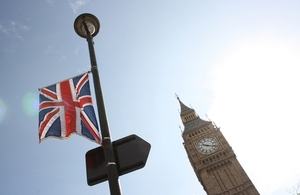Changes to Immigration Rules to benefit global businesses and international students
Changes to the Immigration Rules announced on 6 September will give greater flexibility to business visitors and to businesses that employ and sponsor international migrants.

Big Ben Crown Copyright
The changes will also make the UK more attractive to international students by allowing them to take up corporate internships after completing their degree and making it easier for graduate entrepreneurs to take up skilled jobs.
The changes to the business visitor route will allow employees to undertake corporate training in the UK where it is delivered by an external company. Global organisations will now be able to bring their own auditors to the UK on a business visitor visa, making it easier for them to complete international audits. Business visitors will also be able to do a short course of study while they are here.
The Home Office has also made changes to the Intra-Company Transfer (ICT) route to enable employees already on this visa to extend it without having to take a language test. The ICT route is already well regarded with business customers telling us that it is “the most user-friendly in the world”.
Immigration Minister Mark Harper said:
The UK is open for business: we are building an immigration system that works in the national interest and supports growth.
Today’s changes will ensure that the UK continues to attract global talent to work for British businesses and study at our world-class universities.
Immigration reform is working; we have tightened immigration routes where abuse was rife, while still encouraging the brightest and the best to come to the UK.
Individuals on Graduate Entrepreneur visas will be able to switch to a skilled workers visa more easily under the new rules, ensuring that the best global talent is able to stay in the UK to work. They will be able to switch visas for a job with a “new entrant” salary and the sponsor won’t have to complete a Resident Labour Market Test.
Further changes made include:
- Colleges and UK tourism will benefit from changes to the general visit visa, which will enable tourists to complete courses, including leisure and English courses. It will mean those coming to the UK primarily to visit family or for tourism won’t have to apply for a student visitor visa to take a short course, for instance in activities like sailing or horse riding.
- Expanding the Exceptional Talent route to artists with exceptional promise, rather than just those who have already proved themselves to be world leaders in their field. Artists applying for this route will have to have been endorsed by the Arts Council.
- Adjusting the Immigration Rules to allow some former locally engaged staff in Afghanistan to relocate to the UK as outlined in the Secretary of State for Defence’s statement of 4 June 2013. The new rules will allow eligible applicants, their spouse / partner and their minor dependant children to be granted a period of five years’ leave to enter if their character and conduct is satisfactory.
- Creating two new temporary routes specifically to enable Commonwealth Games Family Members to come to the UK as visitors to participate in the 20th Commonwealth Games in Glasgow. The two routes are for adult and child Games Family Members. Games Family Members include athletes, coaches, officials, and other support staff.
- Removing the rule that blocked skilled working visa applicants who earn over £152,100 from owning more than 10% of the sponsor business’s shares.
- Expanding the use of the “genuineness” test into other visa routes including for students applying for student visas when already in the UK, Ministers for Religion and Temporary Workers. The “genuineness” test gives caseworkers greater scope to test the evidence presented by applicants, particularly in cases where abuse is suspected. These changes will better protect these routes against abuse without disadvantaging legitimate applicants.
Minor changes have also been made to the Family Rules. The changes will benefit UK citizens applying to bring their non European Economic Area (EEA) spouses and children to the UK as they will be given greater flexibility in how they meet and evidence the financial threshold. The changes will include:
- Allowing electronic bank statements to be submitted for all bank accounts, not just online bank accounts.
- Investment-based cash savings held in a bank/savings account will be able to be used to meet the financial requirement, as well as savings in a deposit account.
- Cash savings will be able to include the net proceeds from a property sale, within the 6 month period prior to application. Savings must be evidenced and the property owned by the applicant and/or their partner.